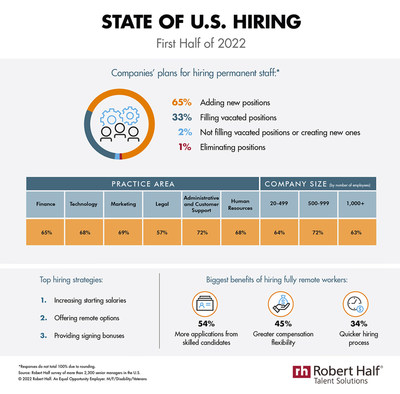The job market will continue its recovery well into 2022, research from talent solutions and business consulting firm Robert Half suggests. According to the company’s State of U.S. Hiring Survey of more than 2,300 senior managers, 65% of respondents anticipate adding new permanent positions in the first half of the year, up 14 points from six months ago; another 33% expect to fill vacated positions.
Amid talent and skills shortages, employers are more willing to hire remote professionals — and they’re wise to do so.
Among the 24 U.S. cities in the survey, those with the highest percentages of employers planning to add permanent positions are Charlotte (75%), San Francisco (74%) and Detroit (72%). In addition, managers in administrative and customer support (72%) and marketing (69%) departments have the greatest hiring needs.
View an infographic of the research highlights, including results by practice area and company size.
Contract hiring is also heating up: Nearly three-quarters of senior managers (71%) expect to bring in more contract professionals in 2022. Those in marketing and technology departments (78% each) are most likely to increase the number of contract workers they use.
Top Hiring Strategies
According to the research, companies are pulling multiple levers to attract skilled candidates:
- 55% are increasing starting salaries.
- 50% are offering remote options and evaluating candidates outside of their office’s geography.
- 44% are providing signing bonuses.
- 41% are giving more paid time off.
- 31% are loosening education, skills or experience requirements.
“Today’s professionals have more career options and negotiating power than ever,” said Robert Half senior executive director Paul McDonald. “In order to land the best talent, employers must move quickly, create a positive candidate experience from the initial contact to the job offer, and provide competitive salaries and flexible work options.”
Remote Recruiting Opportunities
Adopting a remote-first approach can give employers a leg up when competing for top talent: Previous Robert Half research reveals more than half of professionals (54%) are interested in pursuing fully remote positions.
Findings from the State of U.S. Hiring Survey show many companies recognize the benefits of offering fully remote roles:
- More applications from skilled candidates (54%)
- Greater compensation flexibility (45%)
- A quicker hiring process (34%)
McDonald noted, “Amid talent and skills shortages, employers are more willing to hire remote professionals — and they’re wise to do so. But recruiting and managing workers from afar can be easier said than done. Partnering with a staffing firm that has a global footprint and an extensive talent network can save companies time and money.”
Remote Hiring and Onboarding Challenges
When asked to reveal the biggest obstacle to hiring remote talent, the top responses among senior managers were:
- Assessing candidates’ skills through virtual interviews
- Developing compensation packages for candidates outside of the company’s city or state
- Scheduling virtual interviews across multiple time zones
And when it comes to onboarding employees remotely, human resources managers said the greatest challenges are:
- Building engagement and connection
- Providing training and support
- Having adequate equipment and technology
“The first days on a job are always a bit overwhelming, and even more so in a virtual environment. An effective remote onboarding process requires significant time and focus to plan and execute, but pays off when done right,” said Lynne Smith, Robert Half senior vice president of global human resources.
Thanks for reading CPA Practice Advisor!
Subscribe Already registered? Log In
Need more information? Read the FAQs
Tags: Benefits





